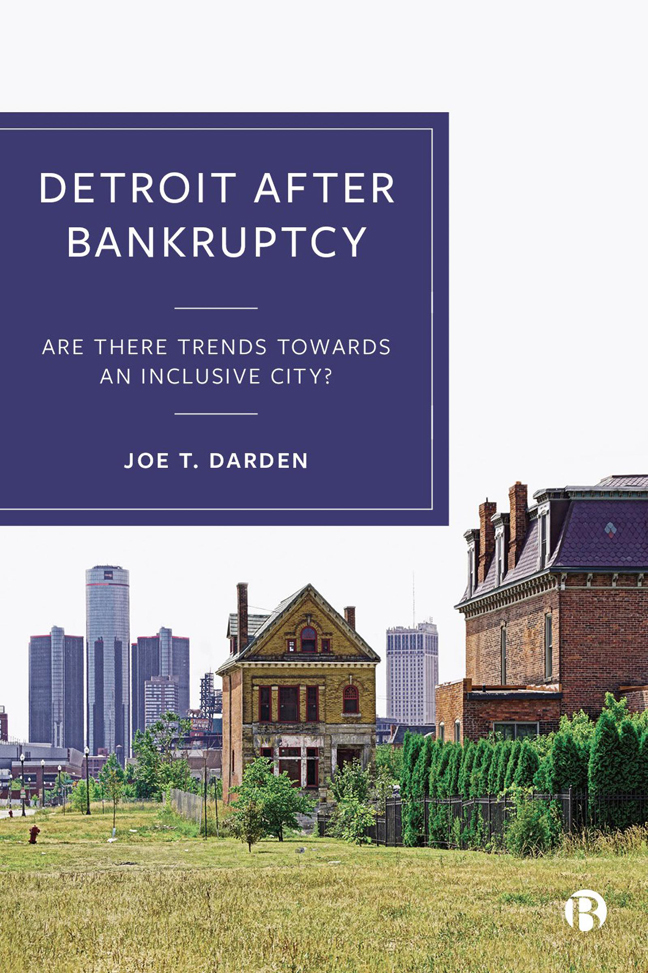Book contents
- Frontmatter
- Dedication
- Contents
- List of Figures and Tables
- Acknowledgments
- Preface
- 1 Antecedents to Bankruptcy
- 2 Detroit Bankruptcy: The Characteristics of the Decision Makers and the Differential Benefits Afterwards
- 3 The Postbankruptcy Social and Spatial Structure of Metropolitan Detroit: Anatomy of Class and Racial Residential Segregation
- 4 Gentrification: A New Method to Measure Where the Process Is Occurring by Neighborhood
- 5 The Uneven Distribution of Economic Redevelopment: Which Neighborhoods Are Excluded?
- 6 Black and Hispanic Underrepresentation in Business Ownership in a Majority-Black City
- 7 Racial Inequality in Student Academic Achievement Levels: A Neighborhood Solution to the Problem
- 8 Unequal Exposure to Crime in the City of Detroit: A New Method to Measure Exposure by the Characteristics of Neighborhoods
- 9 Solving the Problem of Extreme Race and Class Inequality: Implementing the Spatial Mobility Alternative
- 10 Conclusions: The Status of the Residents of Detroit after Bankruptcy
- References
- Index
10 - Conclusions: The Status of the Residents of Detroit after Bankruptcy
Published online by Cambridge University Press: 25 January 2024
- Frontmatter
- Dedication
- Contents
- List of Figures and Tables
- Acknowledgments
- Preface
- 1 Antecedents to Bankruptcy
- 2 Detroit Bankruptcy: The Characteristics of the Decision Makers and the Differential Benefits Afterwards
- 3 The Postbankruptcy Social and Spatial Structure of Metropolitan Detroit: Anatomy of Class and Racial Residential Segregation
- 4 Gentrification: A New Method to Measure Where the Process Is Occurring by Neighborhood
- 5 The Uneven Distribution of Economic Redevelopment: Which Neighborhoods Are Excluded?
- 6 Black and Hispanic Underrepresentation in Business Ownership in a Majority-Black City
- 7 Racial Inequality in Student Academic Achievement Levels: A Neighborhood Solution to the Problem
- 8 Unequal Exposure to Crime in the City of Detroit: A New Method to Measure Exposure by the Characteristics of Neighborhoods
- 9 Solving the Problem of Extreme Race and Class Inequality: Implementing the Spatial Mobility Alternative
- 10 Conclusions: The Status of the Residents of Detroit after Bankruptcy
- References
- Index
Summary
The aim of the book has been to provide a detailed analysis of patterns of development in Detroit after bankruptcy and determine whether or not these developments have been equitable and inclusive. Over the course of the last nine chapters I have measured: (1) changes in trends toward an inclusive city; (2) whether more racial equality occurred after bankruptcy; and (3) whether the data and analyses answered the question of whether Detroit met its overall objective of becoming a more racially inclusive city after bankruptcy.
I started the book by focusing on the antecedents to bankruptcy. On July 18, 2013, Black lawyer Kevyn Orr was appointed Emergency Manager by Republican Governor of Michigan Rick Snyder. Orr's task was to conduct research on the predominantly Black city and recommend a legal decision to declare the City of Detroit bankrupt. According to Bloomberg News (2013), Emergency Manager Kevyn Orr rushed the $18 billion bankruptcy petition into federal court on July 18 just minutes before a state judge could stop him. The decision by the Emergency Manager made the City of Detroit the largest city in the US to experience bankruptcy.
Chapter 1 examined the historical, economic, social, demographic, racial, and non cooperative relationship between the State of Michigan and the City of Detroit that led to the bankruptcy decision. There is evidence to suggest that the seeds for Detroit's bankruptcy were planted over time by the actions of investors, who reduced their investments in the City of Detroit and increased investment in the suburbs over a period of 60 years (Darden et al, 1987). These actions resulted in increased unemployment in the city, the outmigration of the white middle class, a decline in property values, an increase in housing abandonment, and a reduction in tax revenue for city services (Gillette, 2014). Instead of financial assistance from the State, Detroit, like other cities in Michigan, was faced with a reduction in revenue sharing (Lavelle, 2014; Sapotichne et al, 2015). Such disinvestment by the private sector and a reduction in revenue sharing by the State made the financial problems of the city very difficult to solve (McFarland and Pagano, 2014).
Instead of providing the financial support needed, the Governor used a new, stronger Republican-passed Emergency Manager Law in 2011 to remove the democratically elected African American Mayor and the City Council from power (Pew Charitable Trusts, 2013).
- Type
- Chapter
- Information
- Detroit after BankruptcyAre There Trends towards an Inclusive City?, pp. 189 - 203Publisher: Bristol University PressPrint publication year: 2023



